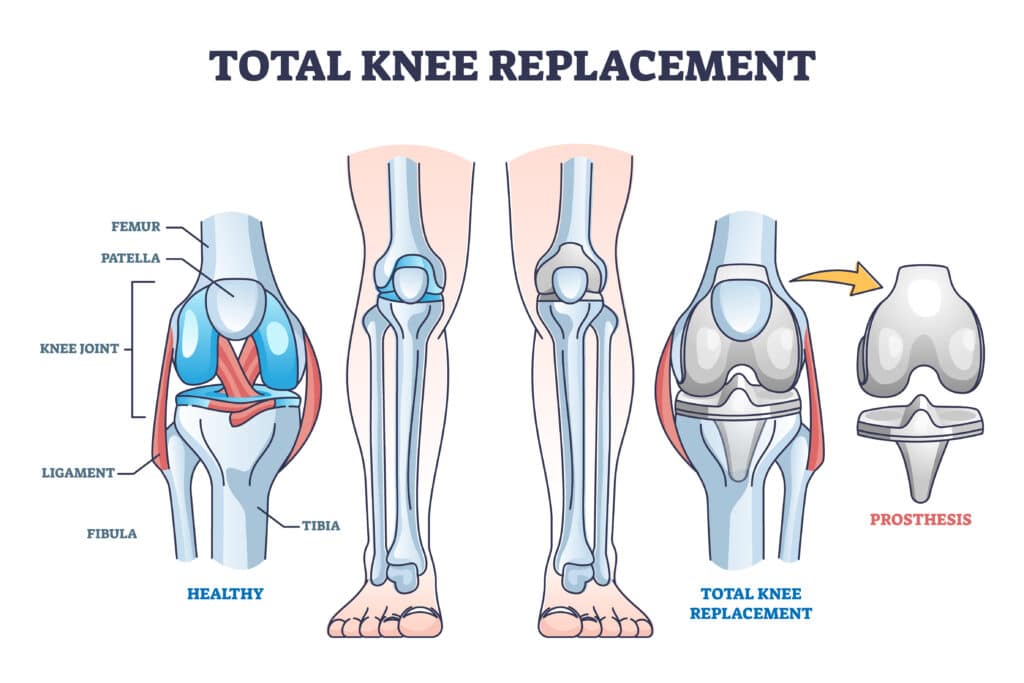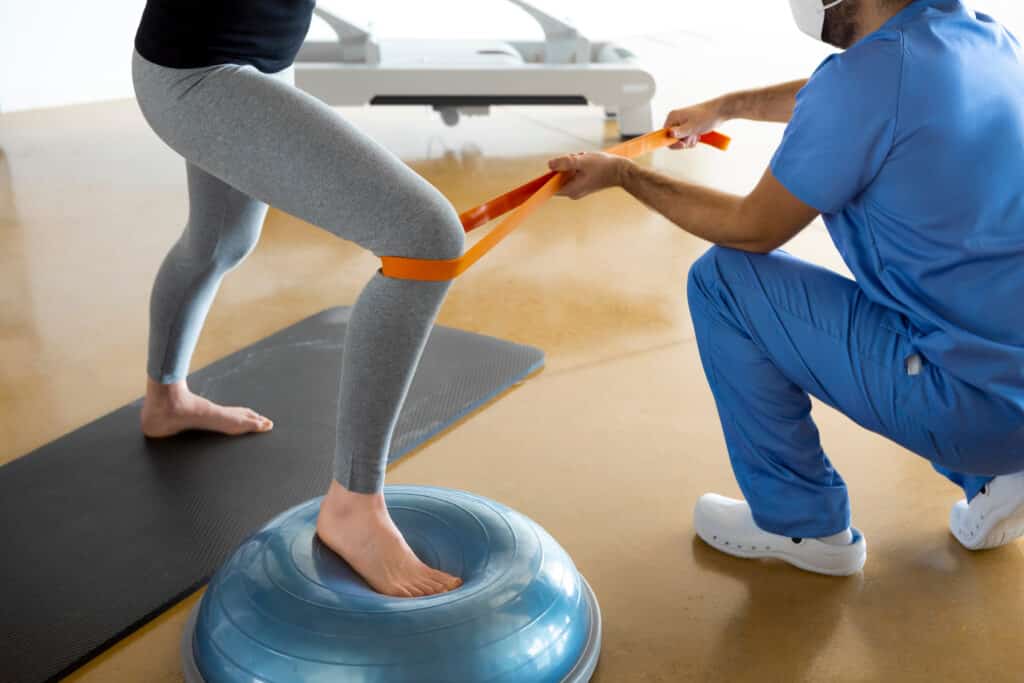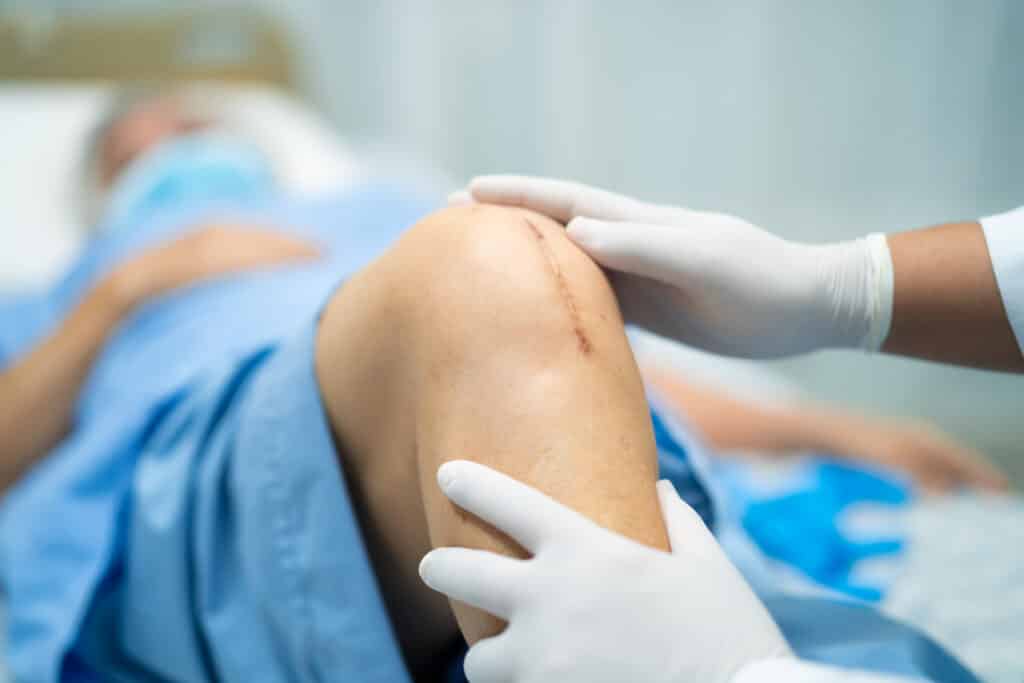What To Expect 1 Year After Total Knee Replacement
Making the decision to undergo a total knee replacement isn’t something most people do lightly. Those living with knee pain and weighing their treatment options may want to know what to expect 1 year after total knee replacement to decide if it’s worth it. The good news is that most total knee replacements feel significantly better just months after surgery, with almost all healing complete in 1 year.
Total Knee Replacement Surgery

Total knee replacement surgery removes damaged portions of the knee and replaces them with prosthetics. Generally, those who undergo this procedure do so because they want a better quality of life and have exhausted other treatment options.
Total Knee Replacement Recovery
A significant portion of recovery from total knee replacement takes place within about 3 to 4 months after surgery. Beginning a guided healing protocol immediately after joint replacement surgery is important to achieve such quick results.
Immediately Post Surgery
Once you wake up from anesthesia, you will likely spend at least a few hours in a recovery room icing and elevating your knee. You may be prescribed pain medication and instructed to take over-the-counter anti-inflammatory medications.
Many patients will be discharged the same day as surgery and may be surprised to find they can already walk with the help of a cane or walker.
1st Week After Surgery
The first week after knee surgery is the hardest. Once you’re home, you’ll continue to elevate and ice your knee while taking medication as prescribed or needed. You may be told to use gentle compression via a compression bandage or stocking to help with the swelling. Most patients start physical therapy within 1 week of knee surgery.

You should be able to move around with the help of a walker or cane. Remember, your knee will get tired, and you’ll likely want help with meal preparation, household tasks, and driving. You can get in and out of bed, go up and down stairs while holding the railing, and take short walks. Plan to walk a little every hour and elevate your leg once you return home. It may sound counterintuitive, but continual gentle movement will help with the pain and improve recovery time.
Your knee will be swollen and may be red and bruised. It’s normal for the incision to drain a bit as it heals. If you develop a fever above 101.5 degrees Fahrenheit or see significant pusy discharge, call your orthopedic knee surgeon. They will also give you a list of additional symptoms to watch out for. If you’ve been prescribed blood thinners as part of your recovery, you may see increased swelling and bruising at the surgical site.
Total Knee Replacement Pain at Night
For the first several weeks after a total knee replacement, pain may be most noticeable at night. You may want to ice your knee and take pain medication before bed, then sleep with it slightly bent and elevated.
Some patients find the disruption to sleep after knee replacement calls for daytime naps, especially after performing total knee replacement exercises.
1 Month After Surgery
Some people will be ready to return to work a month after surgery, depending on their vocation. You likely won’t be ready if your job requires standing or manual labor. Physical therapy exercises for a knee replacement will still be an important part of regaining strength and range of motion. You’ll likely need pain relievers periodically and get pain relief from icing and elevating your knee.
You should still walk with a cane until about the 6-week mark, even if you feel stable and comfortable without it. Certain medical procedures, like dental work or colonoscopies, should not be performed until you’re 3 months out from surgery.
3 Months After Total Knee Replacement
Recovery from knee replacement generally takes a big step forward around 3 to 4 months. You should be sleeping better and able to walk without assistance, but continue to use care on stairs. Those who stand at work will likely be ready to return to their jobs. Most people can start exercising again.

Your knee may be a bit stiff and swollen, especially after standing or sitting for extended periods. It’s normal for your knee to still feel warm, but it should not be hot or painful to touch.
6 Months After Total Knee Replacement
Six months after a knee replacement, patients will notice most symptoms after standing or sitting for long periods. Pain, stiffness, and swelling should not be significant enough to require medication.
What To Expect 1 Year After Total Knee Replacement
One year post total knee replacement, most patients will be fully recovered in terms of range of motion and pain. You may have some numbness around your total knee replacement scar, which is normal due to nerves in that area having been cut.
Your knee may make some clicking sounds, or you may feel some clicking during certain movements. This should not be painful and is simply caused by the prosthetic pieces making contact with each other. Your knee may still feel a bit stiff, sore, or warm, but that will continue to improve with time. Some movements, such as squatting, kneeling, or bending down, may feel different than before your total knee replacement, especially if you had surgery due to osteoarthritis.
If you have knee pain and would like to talk to an orthopedic knee specialist about treatment options to regain your quality of life, please contact us or comment below.
31 Comments
Permalink
Total knee replacement Dec 11 2023, pain in my inner knee is almost unbearable, I have a feeling of water dripping down my leg, if I move wrong in bed,the pain causes me to scream in pain. My ortho sent me to a vascular doctor, in order for me to make an appointment, I had to have a Venus reflux test. It came back normal. So I didn’t see Vascular Dr.
My primary care doctor ordered an MRI. It came back normal.
What do I do now? I had almost 6 months of therapy as well. I still have difficulty going up and down stairs without a handrail etc. Any activity over 10 minutes and the pain is there for the rest of the day.
Any suggestions?
Permalink
Hi Julie,
I’m so sorry to hear you’re dealing with this level of pain. Since your tests and therapy haven’t provided answers, it might help to get a second opinion from another orthopedic specialist. Persistent pain like this after a total knee replacement could be caused by several things, like implant issues, soft tissue irritation, or nerve-related problems. A thorough evaluation might uncover something overlooked. You could also ask about a pain management consultation to explore ways to better control the discomfort while searching for solutions. Don’t give up—there’s still hope for finding relief!
Permalink
Hi I ‘ve done total knee replacement 8 months back,my main problem is pains if i don’t take pain killers as sometimes I defer them.
My other problem is my other knee which is not operated, is feeling more painful than the operated one when I walk or stand longer.
Permalink
Hi Thelma, it’s not uncommon to experience some discomfort after a total knee replacement, especially as your body continues to heal. If you’re still in pain after 8 months, it might be helpful to follow up with your surgeon to ensure your recovery is on track. Regarding the pain in your other knee, it’s possible that compensating for the operated knee has put extra stress on it. Consulting an orthopedic specialist can help address both concerns and explore treatment options for your non-operated knee.
Permalink
I had total knee replacement 15 months ago, though I’m back to almost my regular activities, there is still this clicking sounds my knee makes during movements. When I shake my knee side to side, it’s like there are moving implants/tissues/parts inside and it’s really making me nervous…
Permalink
Hi Clarissa,
It’s great to hear you’re back to most of your regular activities! The clicking sound you’re noticing can be common after knee replacement surgery as tissues adjust and your knee continues to heal. However, if it’s making you nervous or feels uncomfortable, it’s always a good idea to check in with your surgeon for an evaluation to ensure everything is healing properly.
Permalink
I had knee surgery 1 year ago. I have stiffness and swelling down to foot and ancle. Is this normal
Permalink
Hi Bernice, it’s not uncommon to experience some stiffness and swelling after knee surgery, even a year later. However, if these symptoms persist or worsen, it’s important to consult your surgeon to ensure there are no complications.
Permalink
I had bilateral knee replacement surgery almost a year ago. I’ve had great success with them and I’m back to my very active lifestyle. My only issue is when I sit for a length of time. Getting up after sitting and walking for the first few moments my knees are stiff and sore. After a few minutes of moving them, they ease up and I’m fine. Is this normal? Will this improve or go away? I almost always dread sitting down to eat, watching TV, or at the computer knowing it’s going to be stiff and sore when I get up!
Permalink
Hi Rick, thank you for sharing your experience! It’s great to hear that you’re back to your active lifestyle. Stiffness after sitting for a while is a common issue following knee replacement surgery. It typically improves over time with continued activity and exercises to increase flexibility and strength. However, if the stiffness persists or worsens, it’s best to consult with your orthopedic surgeon for personalized advice.
Permalink
After 10 months of a total knee replacement I still feel like something is sticking me from inside. It doesn’t happen all the time. Should I been concerned?
Permalink
After 10 months of a total knee replacement I still feel like something is sticking me from inside. It doesn’t happen all the time. Should I been concerned?
Permalink
Hi Marvin,
Total knee replacement recovery can vary from person to person. Some discomfort or unusual sensations might persist for up to a year or more as the body adjusts to the new joint. There are a few reasons why you may be experiencing discomfot such as scar tissue, implant positioning or misalignment, infection, nerve irritation, and sometimes certain movements might exacerbate the sensation. If the sensation is persistent, worsening, or accompanied by other symptoms like swelling, redness, warmth around the knee, fever, or decreased range of motion you should follow up with the orthopedic specialist who performed your surgery. They can conduct a physical exam, and if needed, imaging tests (like X-rays or an MRI) to determine the cause of your discomfort and provide appropriate treatment options.
Permalink
One year after a total knee replacement, most patients experience significant pain relief, improved mobility, and enhanced quality of life. Daily activities become easier, and many can return to low-impact sports and hobbies. Full recovery typically includes continued strengthening and flexibility exercises, but overall, the knee functions much better than pre-surgery. Regular follow-up visits with your orthopedic surgeon ensure optimal recovery progress.
Permalink
Im 11 months in after a total knee replacement. I can’t sit with my knee bent for a long period of time because pain will start shooting from my ankle up to my thigh and around my knee.
Permalink
After 1 year having total knee replacement I have no pain I am riding my bicycle 45 a day at least 5 days a week my leg does get very tired iam 68 years old and very attractive would like to here you comments
Permalink
Email me any comments
Permalink
My knee replacement is great no pain but my leg after 1 year still get very tired I ride my bicycle 45 minutes 5 days a week 👍👍 does any feel that way
Permalink
Hi Robert,
It’s great to hear that your knee replacement is pain-free. However, it’s not uncommon for the leg to still feel tired even a year after surgery, especially after physical activity like cycling. The healing and rehabilitation process can vary for each individual, and full recovery can sometimes take longer than a year. Regular cycling is excellent for strengthening the leg muscles and improving endurance, but if you continue to experience significant fatigue, it may be beneficial to consult with your orthopedic specialist or a physical therapist. They can assess your muscle strength, endurance, and overall fitness level, and provide specific exercises or recommendations to help improve your leg’s stamina. Additionally, ensure that your exercise routine is balanced with adequate rest and recovery periods.
Permalink
I had a full knee surgery 10 months ago. I still find it challenging to walk long distance and difficult to climb the stairs or little hills. Two day ago, I went on walk, my knee gave in and I fell. Shojld I be concern? Any advise would be appreciated
Permalink
Hi Doris,
Given your ongoing challenges and recent fall after full knee surgery, it’s important to consult your orthopedic specialist to assess for complications. Continuing or restarting physical therapy can improve strength, flexibility, and stability. Strengthening exercises, pain management, and possibly using assistive devices like a cane can enhance mobility. Gradually increasing activity levels, maintaining a healthy weight, and considering overall health and mental well-being are also crucial.
Permalink
My 10 month old replaced knee still gets hot & alittle sore when I walk over 45minutes, it also dosent bend as far as my real knee. Normal?
Permalink
Hi Carlene, It’s not unusual for a replaced knee to feel a bit warm and sore, especially after longer walks. However, if you’re concerned about the limited bending or persistent discomfort, it’s best to consult your doctor to make sure you are healing properly.
Permalink
Tengo limitación en estiramiento y en la flexión. Practico deporte de moto de campo. Soy paciente para una prótesis?
Permalink
Es importante consultar con un cirujano ortopédico que pueda evaluar la condición de tu rodilla y determinar si eres candidato para una prótesis de rodilla. Tu capacidad para participar en motociclismo todoterreno y otras actividades dependerá de la gravedad de tus problemas de rodilla y de cómo se puedan manejar con tratamiento. Una evaluación exhaustiva por parte de un especialista te ayudará a obtener la mejor orientación para tu situación.
Permalink
Tengo 69 años y rodilla derecha con grado degenerativo cuatro. Operado dos veces de menisco y con ligamentos cruzados rotos
Permalink
Parece que has pasado por mucho con tu rodilla. Lidiar con problemas degenerativos y múltiples cirugías puede ser desafiante. ¿Has discutido con tu proveedor de atención médica qué opciones podrían estar disponibles para manejar tu rodilla en el futuro? La fisioterapia u otros tratamientos podrían ayudar a mejorar la función de tu rodilla y reducir las molestias. Es importante mantener un diálogo abierto con tu equipo de atención médica para encontrar el mejor camino para la salud de tu rodilla.
Permalink
Me hice reemplazo de rodilla hace dos meses y estoy presentando problemas circulatorios que no limitan mucho por el dolor y pies piernas frías
Permalink
No es raro experimentar problemas circulatorios, como pies y piernas frías, después de una cirugía de reemplazo de rodilla. Estos síntomas pueden ser preocupantes, pero a menudo son resultado de la adaptación del cuerpo a los cambios provocados por la cirugía. Es importante hablar de estos síntomas con tu proveedor de atención médica, ya que pueden ofrecer orientación sobre cómo manejarlos y asegurarse de que no interfieran con tu recuperación. Medidas simples como mantener los pies calientes y mantener una buena circulación a través de movimientos suaves pueden ayudar a aliviar algunos de estos síntomas.
Permalink
Después de mi reemplazo de rodillas tengo problemas circulatorios que no me dejan dormirlo
Permalink
Lamento escuchar sobre tus dificultades. Los problemas circulatorios después de una cirugía de reemplazo de rodilla pueden ser desafiantes. ¿Has discutido estos problemas con tu proveedor de atención médica? Podrían ofrecer alguna orientación o sugerir estrategias para ayudarte a mejorar tu sueño. Es importante abordar estas preocupaciones para asegurarte de que tu recuperación sea lo más tranquila posible.